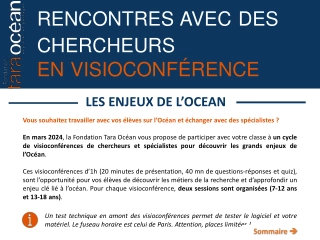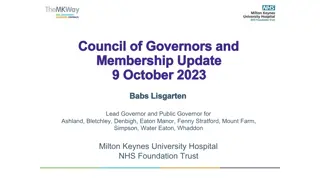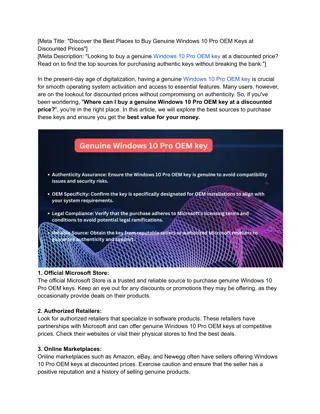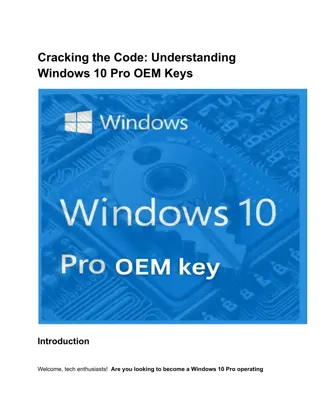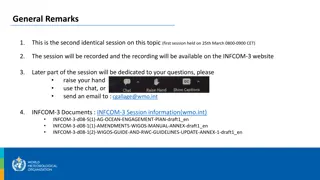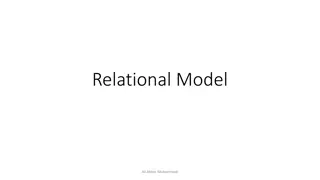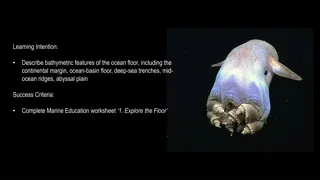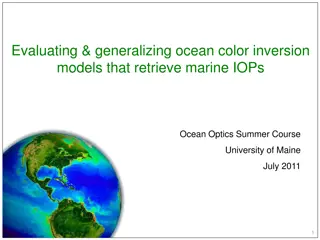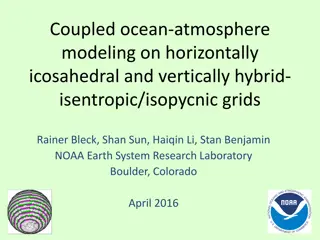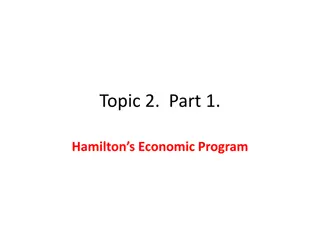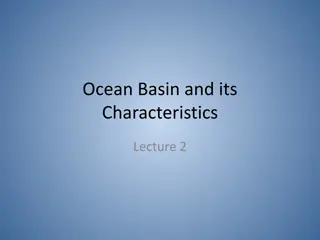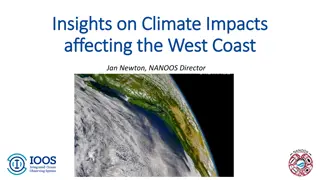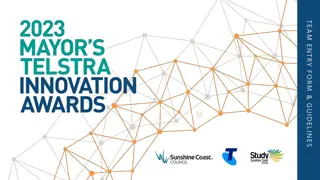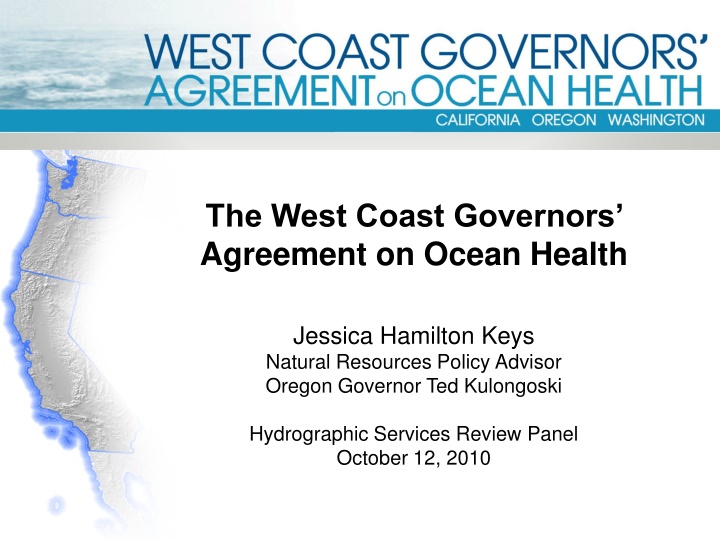
West Coast Governors Agreement on Ocean Health and Management
Explore the collaborative efforts of the West Coast governors, including strategic alliances and shared priorities, to ensure the health and sustainability of coastal waters and habitats through ecosystem-based management and sustainable economic development.
Download Presentation

Please find below an Image/Link to download the presentation.
The content on the website is provided AS IS for your information and personal use only. It may not be sold, licensed, or shared on other websites without obtaining consent from the author. If you encounter any issues during the download, it is possible that the publisher has removed the file from their server.
You are allowed to download the files provided on this website for personal or commercial use, subject to the condition that they are used lawfully. All files are the property of their respective owners.
The content on the website is provided AS IS for your information and personal use only. It may not be sold, licensed, or shared on other websites without obtaining consent from the author.
E N D
Presentation Transcript
The West Coast Governors Agreement on Ocean Health Jessica Hamilton Keys Natural Resources Policy Advisor Oregon Governor Ted Kulongoski Hydrographic Services Review Panel October 12, 2010
The Call for Regional Ocean Management Two national ocean commissions identified the need for a regional, ecosystem-based approach to ocean management We have limited state jurisdiction and capacity to address the size and complexity of the marine ecosystem and diversity of its uses in federal waters New state-federal partnerships and ecosystem-based management are needed to achieve long-term ocean stewardship
The California Current: Transcending Political Boundaries Water pollution Education needs Declining fish populations Degraded marine habitats Climate change impacts Marine research needs
Strategic Alliances Create Collaboration Opportunities Create mechanisms to share lessons learned from all stakeholders Expand scientific and educational efforts Coordinate management strategies for shared coastal and marine resources Engage federal government on issues that warrant national level support and attention
Theodore R. Kulongoski Governor of Oregon Christine O. Gregoire Governor of Washington Arnold Schwarzenegger Governor of California
Shared Priorities for the West Coast Ensure clean coastal waters and beaches Reduce adverse impacts of offshore development Protect and restore healthy ocean & coastal habitats Implement ecosystem-based management Foster sustainable economic development in coastal communities Increase ocean awareness and literacy Expand ocean and coastal scientific research
Executive Committee Oregon Jessica Keys California Brian Baird Washington Bob Nichols Assistant Secretary for Oceans Natural Resource Policy Advisor Policy Advisor Governor Gregoire s Office Natural Resources Agency Governor Kulongoski s Office Federal Partners Usha Varanasi, Dept. of Commerce (NOAA) Alexis Strauss, Environmental Protection Agency Joan Barminski, Dept. of Interior (Ocean Energy Mgmt.)
Examples of the 26 Actions of WCGA Evaluate the potential impacts of offshore alternative energy development Complete a seafloor map for West Coast territorial seas Reduce marine debris Support local planning efforts for working waterfronts Promote clean ports and the Clean Marinas Program
Action Coordination Teams (ACTs) 1. Seafloor mapping 2. Polluted runoff 3. Marine debris 4. Spartina eradication 5. Renewable ocean energy 6. Ocean education 7. Sediment management 8. Climate change 9. Integrated ecosystem assessments 10. Sustainable coastal communities
Future Step: Identify West Coast Research Priorities WCGA Goal: Create a regional research priority plan to strategically focus investments in improved scientific understanding of ocean resources and processes. Based on advice from Sea Grant and other marine experts, the WCGA will identify the top 3 to 5 research priorities for the California Current Large Marine Ecosystem.
WCGA Federal Funding Fiscal Year 2010: $500,000 for WCGA Congressional leadership on Governors request Pacific States Marine Fisheries Commission will manage the grants for the region Eight ACT work plans will be advanced Fiscal Year 2011: $1 million for WCGA Compete with 8 regions for part of $20 million NOAA prioritizing marine spatial planning
National Ocean Policy Framework Common Principles Ecosystem-based management Adaptive management Precautionary approach Minimize cumulative impacts Common Priorities Climate change resilience and adaptation Water quality and sustainable practices Strengthen observation systems
National Framework for Coastal and Marine Spatial Planning Common Goals Support sustainable uses Provide for public access Enhance intergovernmental collaboration Common Principles Reduce conflicts of existing and emerging uses Involve partners, the public, and stakeholders through a transparent process Use best available science-based information
Challenges for Regional CMSP Adequate and sustained funding National consistency vs. regional flexibility Timeline Planning and engagement fatigue Scale Lack of capacity Changes in CA and OR Governors
WCGA Actions in Response to Frameworks Connections to existing regional priorities Integration and alignment with state efforts Structure & organizational adjustments Supporting FY11 mark for $20 million for Regional Ocean Partnerships Responding to NOAA s Federal Funding Opportunity Governance Coordinating Committee names
www.westcoastoceans.gov State seal of California State seal of Oregon State seal of Washington Thank you!
Definitions A healthy ocean and coastmeans that marine, coastal, and estuarine ecosystems, the watersheds that drain into these waters, the plant and animal communities therein, and the physical, chemical, and biological processes involved are diverse and functioning, and the economies and people depending on them are thriving.
Definitions Ecosystem-based management (EBM)is a process that integrates ecological, social, and economic goals, recognizes humans as key components of the ecosystem, and considers ecological boundaries while acknowledging political borders. An EBM approach assesses cumulative impacts from various sources and strives to balance conflicting uses.
Benefits of CMSP on Regional Level Leverage resources Integrate with and advance current state & regional priorities Coordinated regionally but implementation will occur at state level Create common information & roadmap Provide opportunities for increased collaboration with tribes, scientists, stakeholders, and communities


